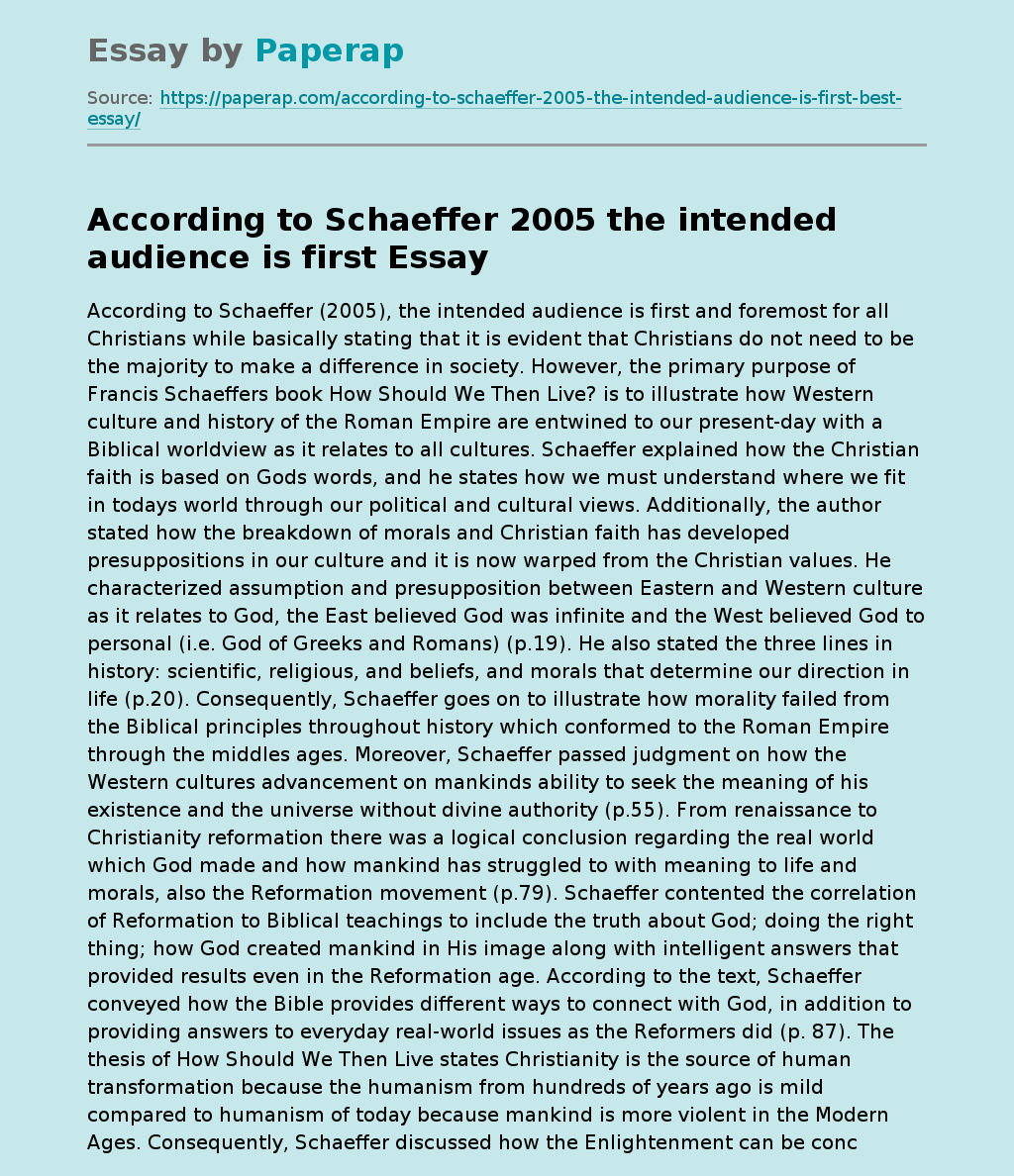Francis Schaeffer "How Should We Then Live?"
The following sample essay on “Francis Schaeffer “How Should We Then Live?””: according to Schaeffer (2005), the intended audience is first and foremost for all Christians while basically stating that it is evident that Christians do not need to be the majority to make a difference in society. However, the primary purpose of Francis Schaeffer’s book “How Should We Then Live?” is to illustrate how Western culture and history of the Roman Empire are entwined to our present-day with a Biblical worldview as it relates to all cultures.
Schaeffer explained how the Christian faith is based on God’s words, and he states how we must understand where we fit in todays world through our political and cultural views.
Additionally, the author stated how the breakdown of morals and Christian faith has developed presuppositions in our culture and it is now warped from the Christian values. He characterized assumption and presupposition between Eastern and Western culture as it relates to God, the East believed God was infinite and the West believed God to personal (ie God of Greeks and Romans) (p 19).
He also stated the three lines in history: scientific, religious, and beliefs, and morals that determine our direction in life (p.20). Consequently, Schaeffer goes on to illustrate how morality failed from the Biblical principles throughout history which conformed to the Roman Empire through the middles ages. Moreover, Schaeffer passed judgment on how the Western cultures advancement on mankinds ability to seek the meaning of his existence and the universe without divine authority (p 55).
From renaissance to Christianity reformation there was a logical conclusion regarding the real world which God made and how mankind has struggled to with meaning to life and morals, also the Reformation movement (p.79). Schaeffer contented the correlation of Reformation to Biblical teachings to include the truth about God; doing the right thing; how God created mankind in His image along with intelligent answers that provided results even in the Reformation age. According to the text, Schaeffer conveyed how the Bible provides different ways to connect with God, in addition to providing answers to everyday real-world issues as the Reformers did (p. 87).
The thesis of “How Should We Then Live” states Christianity is the source of human transformation because the humanism from hundreds of years ago is mild compared to humanism of today because mankind is more violent in the Modern Ages. Consequently, Schaeffer discussed how the Enlightenment can be concluded with nature, happiness, progress, liberty, and reason because it offers secular in reasoning with the humanistic components used in the Renaissance period. During Enlightenment, Schaffer implied that society disconnected human achievements from religion influence which is a flaw of modern science (p.121). In my opinion, Schaeffer painted a world in “How Should We Then Live” that Europe and Western culture were the center of the universe, his narrow-minded thinking totally disregarded the rest of the world. However, Schaeffer explained how societies all through history have failed due to our reliance on humanism because the Renaissance tainted the Biblical society. The Western culture for over four hundred years has preserved the non-religious way of believing in existence regarding the absolute truth of society. Schaeffer suggested that all components of culture such as philosophy, literature, and art shine light while providing examples of how humanity was impacted during the timeline in the book. Consequently, the contribution to law and ethics is morality in its proper place as the rule of the law is common sense.
Conclusion
Schaffer traced the history from the Roman Empire to the Middle Ages and made several parallels to current issues such as the state of society and implications that refer to the collapse of social morality. He went as far as to say how a persons inner peace can have an overwhelming desire to be unaffected by real-world issues or a persons ability to improve the world without gray or doubt. From a personal standpoint as it relates to other published work, I can only conclude that book was overwhelming to read in its entirety, however, what I was able to ascertain is that Schaffer was an evangelist that provided his perception as prophetic view on the world hoping to spread hope that the world would be a better place without all the transgressions (p.258). Schaeffer gave us a glimpse from his perspective writing about ancient Rome to the Middle Ages while introducing the Modern Western culture. Lastly, Schaeffer also annotated the theological and historical beliefs along with the Reformation worldview, in addition, the Enlightenment philosophy was established through the Renaissance era. He believed that Western culture looks bleak and how Christians should be compelled to speak out when they see the wickedness for people who need it.
Francis Schaeffer "How Should We Then Live?". (2019, Dec 17). Retrieved from https://paperap.com/according-to-schaeffer-2005-the-intended-audience-is-first-best-essay/

